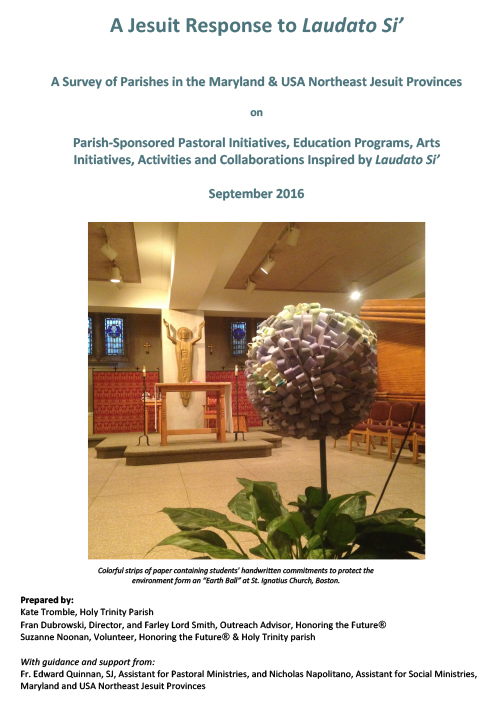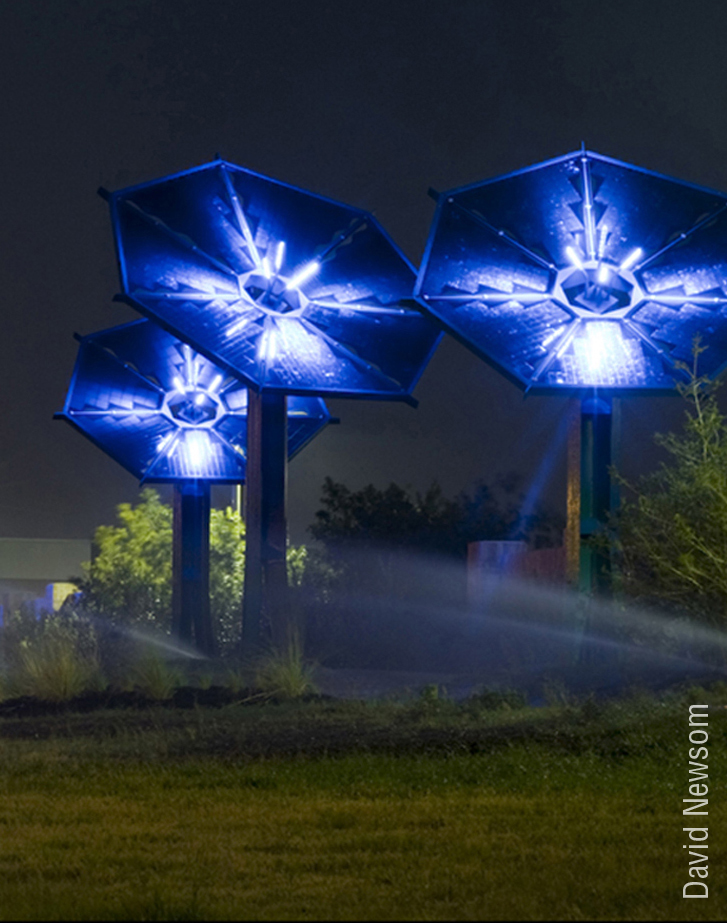Eleven churches, straddling the East Coast from Maine to North Carolina, recently shared ideas with Honoring the Future for successful parish initiatives to implement Pope Francis’ environmental message, Laudato Si’: On the Care of Our Common Home. The churches’ ideas were compiled in an online report for ready sharing with other faith-based communities.
Collectively, the churches are a microcosm of America, encompassing inner cities, suburbs, and college campuses. They range in size from St. Alphonsus Rodriguez, which serves 500 families in Woodstock, MD, to Holy Trinity, serving 3,500 families throughout metropolitan Washington, DC. Some churches date to America’s earliest days – Old St. Joseph’s, Philadelphia, founded in 1733, was colonial America’s first urban Catholic church. Holy Trinity was requisitioned for use as a Civil War military hospital.
Many of the churches witnessed transportation, immigration, and social change transform their communities. St. Aedans formed to meet the needs of Jersey City trolley workers. Sts. Mary and Joseph’s Salem, NH farming community exploded in size with the 1950s growth of the interstate highway system. Old St. Joseph’s saw suburban flight decimate Philadelphia – and urban renewal rebirth a vibrant, growing, diverse community. St. Therese in Mooresville, NC now finds 10% of its parishioners speak Spanish as their primary language. St. Ignatius in downtown Baltimore counts itself enriched by African-American, Filipino, Korean, Chinese, African, and Latino members. Parishioners at St. Francis Xavier in New York City represent a variety of racial and ethnic backgrounds, members of the LGBT community and a growing number of young families. St. Peters welcomes both the native and newly settled in burgeoning Charlotte, NC.
All of the churches are served by Jesuits – members, like Pope Francis, of the Catholic Church’s largest male religious order. The order is widely known for its role as educators – administering well-regarded colleges, universities and high schools – and its commitment to social justice.
Each of the churches viewed Pope Francis’ 2015 encyclical as a call to action. They shared tangible examples of how they had integrated the Pope’s environmental message into ministry to provide inspiration and a starting point for other faith communities.
Their ideas attest to their resourcefulness. Beside homilies and prayers, churches used lectures, bulletins, websites, social media, discussion groups, book clubs, and workshops to educate parishioners. Topics included eco-spirituality, environmental justice, energy efficiency, and carbon footprint reduction.
Arts initiatives abounded. At St. Ignatius, Boston, students wrote commitments to protect the environment on colorful strips of paper; the gathered strips formed a beautiful “earth ball” prominently displayed near the altar. Then-pastor, Fr. Bob VerEecke, SJ, and Assistant Paul Melley composed a song (“Laudato Si’, Praise Be”).
Holy Trinity sponsored a film on the impact of climate change and an Honoring the Future panel, Climate SmART: Honoring Our Children’s Future Through Faith, Art & Action. The program featured dialog and a reception with artists whose work addresses climate change. Sts. Mary and Joseph’s banner called attention to a homily series on “acquisitiveness.”
Churches greened their own operations with energy efficient renovations, recycling programs, reusable water bottle fountains, and fair trade/sustainable coffee. They reconnected urbanites to nature with gardening programs, including support for a garden, managed by the homeless, to feed 60-70 needy individuals.
Churches also called attention to food waste with a “simple supper,” sponsored “No Meat Fridays,” cleaned a local stream, and advocated climate action to government leaders. They collaborated with neighboring parishes, interfaith organizations, and nonprofit organizations. They identified useful online resources and, through their regional province, created a series of 10 online “Reflections” on the encyclical.
Honoring the Future produced the parish survey report in partnership with Kate Tromble, Holy Trinity Pastoral Associate for Social Justice. Fr. Edward Quinnan, SJ, and Nicholas Napolitano – Assistants, respectively, for Pastoral and Social Ministries in the Maryland and USA Northeast Jesuit Provinces – convened the group of participating parishes and provided guidance and support in preparing the report.


